
Executive Function, Burnout, and Career Growth
Burnout rates among neurodivergent professionals are skyrocketing — and traditional productivity advice is part of the problem. This article explores the link between executive dysfunction, ADHD, and career burnout, showing why conventional approaches to time management and productivity fail neurodivergent professionals. Learn how to build sustainable strategies tailored to your brain.

The Hidden Cost of Masking in the Workplace
Masking at work—suppressing neurodivergent traits, emotions, or personal identity—can take a serious toll on mental health and productivity. This article explores the hidden cost of workplace masking, its impact on individuals and businesses, and why fostering authenticity is key to a thriving work culture.

My Journey: Masking and Unmasking
For years, I shaped myself into who I thought I was supposed to be—masking every part of myself to fit in. My late ADHD diagnosis and perimenopause shattered that illusion, forcing me to unmask and rediscover who I truly am. Read my journey through self-discovery, grief, and ultimately, freedom.

Did You Know? Unmasking Doesn't Mean Losing Social Skills
Unmasking doesn’t mean losing the ability to communicate—it means learning to engage in ways that align with your true self. If you’ve spent years masking ADHD or autistic traits, you might worry that letting go means losing essential social skills. But the truth? Unmasking helps you connect more authentically while still using the strategies that genuinely work for you.

What is: Masking?
Masking is a survival strategy used by many neurodivergent individuals to hide their natural traits and conform to social expectations. While it can help in certain situations, chronic masking can lead to mental exhaustion, self-doubt, and emotional burnout. This article explores the impact of masking, why people do it, and how to unmask safely while embracing authenticity.

What is: Emotional Dysregulation?
Emotional dysregulation makes it difficult to manage emotions, cope with stress, and maintain stable relationships. Often linked to ADHD, trauma, RSD, and hormonal changes, it can lead to mood swings, emotional overwhelm, and impulsivity. Learn the science behind emotional dysregulation and discover effective, neurodivergent-friendly strategies for emotional balance.

How a Neurodivergent Business Coach Helps You Shine in a Neurotypical Business World
The workplace wasn’t built for neurodivergent professionals—but coaching can help you thrive in it. Learn how ADHD, autism, and executive coaching create success.

The Link Between ADHD and Perfectionism: Breaking the Cycle
ADHD and perfectionism often go hand in hand, leading to procrastination, task paralysis, and burnout. This post explores why perfectionism is common in ADHDers, how it ties to RSD and people-pleasing, and actionable strategies to break free from the cycle and embrace progress over perfection.

Did You Know? How Did ADHD Get its Name.
Did you know ADHD’s name has changed multiple times over the years? From “Defective Moral Control” in 1902 to ADD and then ADHD, the evolving terminology reflects changing understandings of this neurotype. But does Attention-Deficit/Hyperactivity Disorder really describe ADHD accurately? Some argue the name should change to reflect ADHD strengths rather than just challenges. Dive into the history, debate, and future of ADHD’s name.

My Journey: cPTSD with ADHD
ADHD and cPTSD often intertwine, making traditional coping strategies ineffective. My journey of discovery helped me understand how trauma and neurodivergence shape my daily life. Through self-acceptance, medication, and a strong support system, I'm learning to navigate both challenges with resilience and grace. If you're struggling with ADHD and cPTSD, know that you're not alone—there is hope and a way forward.

My Journey: ADHD
For most of my life, I knew I was different but didn’t have the words to explain why. My ADHD journey—from struggling in school and work to embracing my strengths—has been one of resilience, self-discovery, and transformation. Here’s how I finally found clarity and learned to work with my neurodivergent brain instead of against it.

What Is: Neurodiversity?
ADHD and cPTSD often intertwine, making traditional coping strategies ineffective. My journey of discovery helped me understand how trauma and neurodivergence shape my daily life. Through self-acceptance, medication, and a strong support system, I'm learning to navigate both challenges with resilience and grace. If you're struggling with ADHD and cPTSD, know that you're not alone—there is hope and a way forward.

What is: ADHD - A Different Brain, Not a Deficient One
ADHD is often misunderstood as a lack of focus or discipline, but in reality, it’s a unique brain wiring that affects executive function, attention regulation, and motivation. While ADHD presents challenges in work, productivity, and emotional regulation, it also comes with strengths—such as creativity, resilience, and innovation. Learn how ADHD truly works, why it’s not a deficiency, and how to harness its full potential.

What is: Coaching
What is: Coaching
Coaching isn’t just for athletes or executives—it’s a powerful tool for anyone feeling stuck, overwhelmed, or ready for change. Unlike therapy or mentoring, coaching helps you gain clarity, overcome obstacles, and take intentional action to achieve your goals. Learn how coaching works, why it’s backed by neuroscience, and how it can help you unlock growth, confidence, and success.
